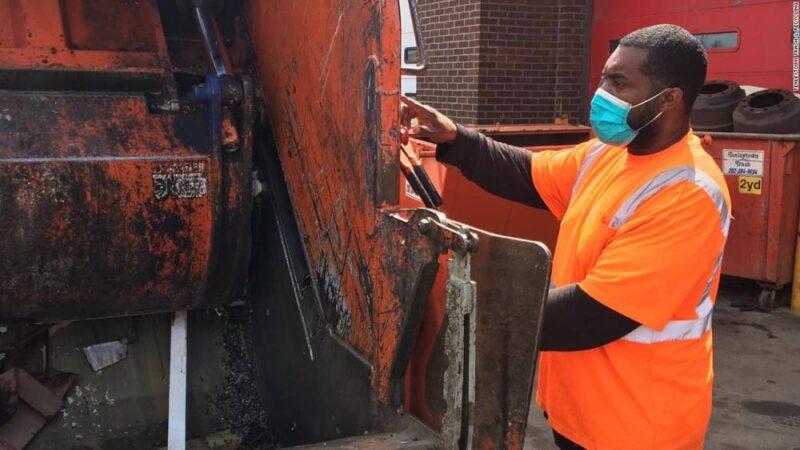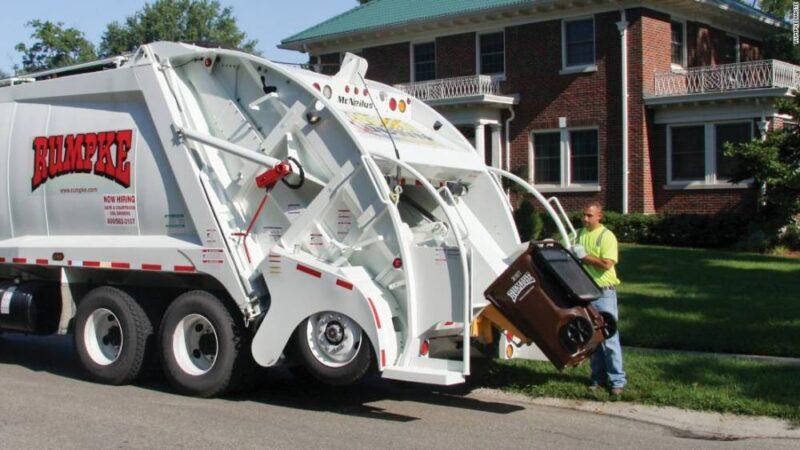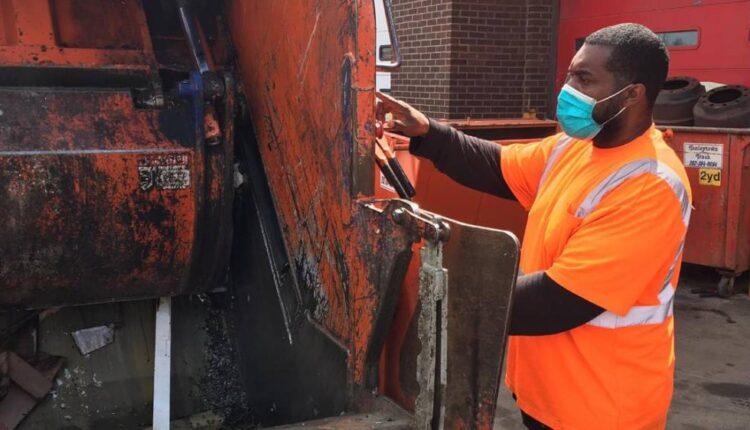Washington, DC (CNN)Barney Shapiro, owner of Tenleytown Trash, never expected that he would turn to the Washington National Opera’s costume department to design gear for his employees. But when a member of his staff heard the National Opera was sewing masks for workers on the frontlines of the coronavirus pandemic, he jumped at the chance.
Shapiro’s staffers haul trash in Washington, DC, and Maryland. Like the entire waste management industry, Shapiro is trying to keep his employees healthy and safe so they can handle the massive influx of household trash that is accumulating as more Americans self-quarantine at home.”Our residential volumes are drastically increased,” Shapiro said. “People are calling in and asking for increased services. We can’t do that on a short-term basis. It’s just a nightmare.”

Tenleytown Trash workers are wearing masks made by the Washington National Opera’s costume department.Republic Services, one of the largest waste management companies in the US, said it expects the volume of residential garbage to increase by as much as 30%. In order to redirect resources and address the growing amount of day-to-day household waste, about 50 communities nationwide have paused curbside recycling pickup and dozens have suspended yard waste collection, according to the Solid Waste Association of America. Other companies are shifting workers to residential routes and away from slower commercial routes where many of the businesses have closed.Companies are also making contingency plans in case the residential volume becomes too great or their workers get sick. Read MoreShapiro said one of his drivers and the colleague he rides with have both tested positive for coronavirus, as well as one of his administrative employees. Another driver recently said he was scared to work and is staying home, according to Shapiro. And Shapiro, who employs 32 drivers, is growing concerned that more employees will want to do the same. “I hate to say this. Those things do tend to snowball,” he said. “I can’t say to a driver, ‘No I want you working.’ Quite honestly, they’re being put at risk.”David Biderman, CEO of the Solid Waste Association of North America, said the industry has seen a slight uptick in absenteeism so far. That’s mostly been due to workers who have been quarantined after a potential exposure to the virus or who need to stay home because their kids are out of school. But he expects those absenteeism figures to increase, especially in areas that have yet to start to flatten the curve when it comes to new coronavirus cases and fatalities.At Tenleytown Trash, all of Shapiro’s backup drivers have been called in and he has hired an extra worker just to keep everything sanitized. Shapiro said the company’s trucks are sanitized daily and cleanings at its offices have increased, too. All of this is adding pressure to the industry when its services are needed the most.Bill Rumpke Jr., CEO of Rumpke Waste & Recycling, has hired 36 new employees in the last week to deal with an increase in residential volume in the markets where it operates in Ohio, Indiana, Kentucky and West Virginia.

Rumpke Waste & Recycling has hired new employees in the last week to handle a massive influx in household trash.Rumpke said he’s facing financial losses due to the dramatic drop in commercial and industrial business, but his main concern right now is keeping his employees safe and meeting the increased demand for residential waste pickups. He’s prepared to suspend yard waste and bulk trash pickup if necessary. “We’ve been able to stay ahead of it so far,” Rumpke said. “Hopefully, we’ll be able to stay on schedule.”To offset increased labor costs and declining revenue, Rumpke said the company plans to cut back on other expenses, such as a planned IT project and the purchase of new heavy equipment. The challenge of coronavirus is unlike anything the company has faced in its 88 years of operation, Rumpke said. If there’s an outbreak among its staff, the company is preparing to shift labor between its markets or to delay service.
One way Americans can help, said Biderman, is to hold off on spring cleaning and limit curbside waste. “[Spring cleaning is] going to put additional pressure on an already pressured solid waste collection system,” Biderman said. “Wait until things return to normal.”
Source: edition.cnn.com

